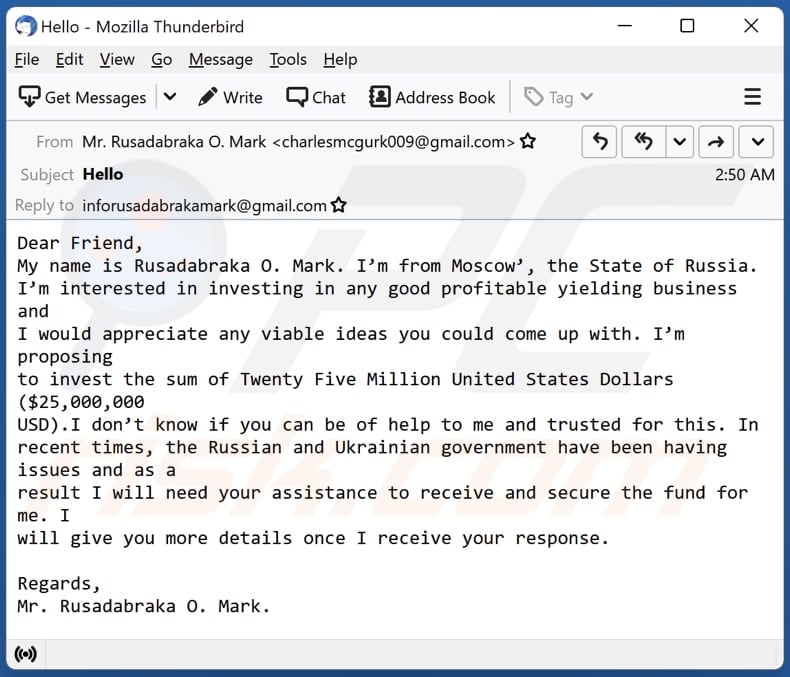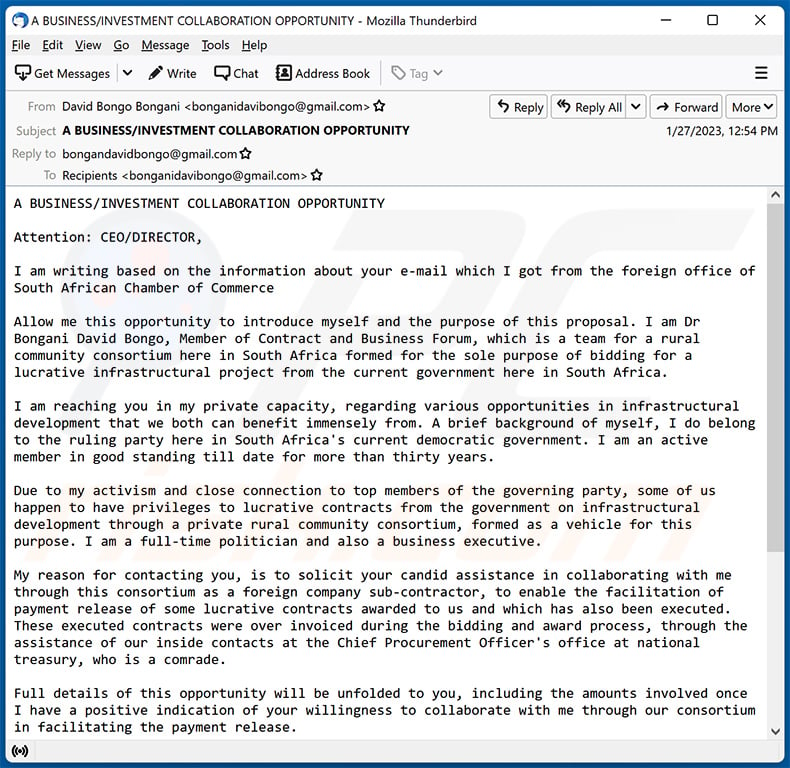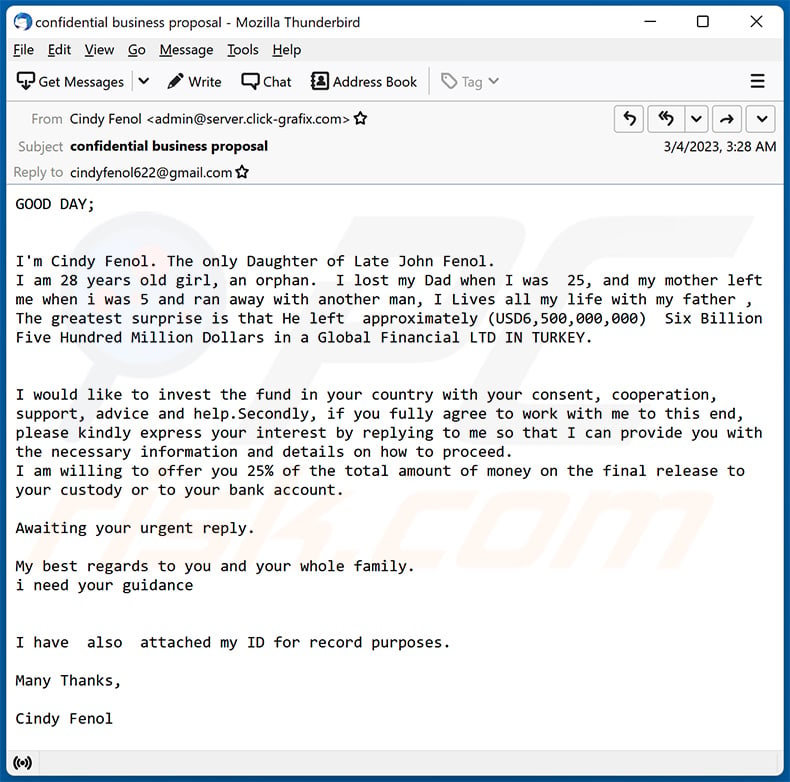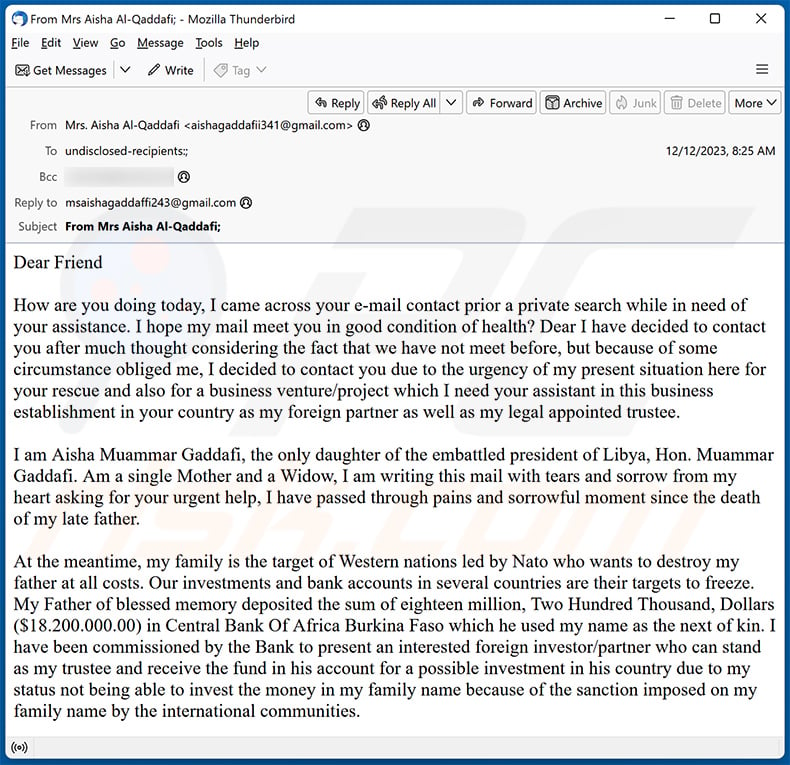How to prevent email scams like "Looking For Business To Invest"
Phishing/ScamAlso Known As: Looking For Business To Invest investment scam
Get free scan and check if your device is infected.
Remove it nowTo use full-featured product, you have to purchase a license for Combo Cleaner. Seven days free trial available. Combo Cleaner is owned and operated by RCS LT, the parent company of PCRisk.com.
What kind of scam is "Looking For Business To Invest"?
We have determined that this letter is an investment scam email. The individuals behind this scam purport to be interested in investing in a business and request the recipient's assistance with receiving and securing funds. Such scam emails are frequently used to obtain money and (or) personal information from unsuspecting users.

More about the "Looking For Business To Invest" scam email
This email claims that a person named Rusadabraka O. Mark, from Moscow, Russia, expresses interest in investing in a profitable business. He proposes to invest $25,000,000 in a business idea and request assistance in receiving and securing the funds. He asks for any viable business ideas and indicates that he will provide more details upon receiving a response.
Typically, the individuals perpetuating investment scams promise high returns, easy money, and guaranteed profits. Their goal is to deceive recipients into providing personal information, such as credit card details, identification documents, social security numbers, or other sensitive information, or transferring money to them.
However, those who fall for these scams never see any financial gain. Instead, they lose money, and by providing personal information to scammers, they risk having their identities stolen, their online accounts compromised, and more. Therefore, suspicious emails offering easy money must be ignored.
| Name | Looking For Business To Invest Email Scam |
| Threat Type | Phishing, Scam, Social Engineering, Fraud |
| Fake Claim | The individual behind this letter is willing to invest money in a business idea |
| Disguise | Letter from a person named Rusadabraka O. Mark |
| Symptoms | Unauthorized online purchases, changed online account passwords, identity theft, illegal access of the computer. |
| Distribution methods | Deceptive emails, rogue online pop-up ads, search engine poisoning techniques, misspelled domains. |
| Damage | Loss of sensitive private information, monetary loss, identity theft. |
| Malware Removal (Windows) |
To eliminate possible malware infections, scan your computer with legitimate antivirus software. Our security researchers recommend using Combo Cleaner. Download Combo CleanerTo use full-featured product, you have to purchase a license for Combo Cleaner. 7 days free trial available. Combo Cleaner is owned and operated by RCS LT, the parent company of PCRisk.com. |
Similar scam emails in general
It is common for scam emails to be disguised as official/important/urgent letters from real people, legitimate companies, organizations, or other entities. Typically, they are used to extract sensitive information or money (including cryptocurrency). They often include links to phishing websites (e.g., fake pages prompting to provide login information).
Examples of scam emails are "Investment Into Building Homes For Orphans", "Attached Payment Invoice", and "Update Your Email Account Scam". It is important to mention that emails sent by cybercriminals can be used to deliver malware.
How do spam campaigns infect computers?
Cybercriminals often use emails to deceive users into downloading and installing malware on their computers. These emails contain malicious attachments or links that, when opened, infect computers with malware. The attackers aim to lure recipients into executing the malware via opened attachments or links.
Examples of files that are used to spread malware usually include malicious executable files, JavaScript files, archive files (such as ZIP or RAR), ISO images, Microsoft Office documents, and PDFs.
How to avoid installation of malware?
It is important to thoroughly investigate emails before opening any links or attachments. Be wary of emails from unknown senders, as they can contain malware. Do not open files downloaded from unofficial websites, third-party downloaders, or P2P networks to avoid infection. Instead, only download software from reputable sources such as official websites and app stores.
Also, keep your computer (the operating system and installed applications) up-to-date to protect your computer from malware. Using reputable antivirus software and regularly scanning a computer for threats is also recommended.
If you've already opened malicious attachments, we recommend running a scan with Combo Cleaner Antivirus for Windows to automatically eliminate infiltrated malware.
Text presented in the "Looking For Business To Invest" email letter:
Subject: Hello
Dear Friend,
My name is Rusadabraka O. Mark. I’m from Moscow’, the State of Russia.
I’m interested in investing in any good profitable yielding business and
I would appreciate any viable ideas you could come up with. I’m proposing
to invest the sum of Twenty Five Million United States Dollars ($25,000,000
USD).I don’t know if you can be of help to me and trusted for this. In
recent times, the Russian and Ukrainian government have been having issues and as a
result I will need your assistance to receive and secure the fund for me. I
will give you more details once I receive your response.Regards,
Mr. Rusadabraka O. Mark.
Another example of an email from "Looking For Business To Invest" spam campaign:

Text presented within:
Subject: A BUSINESS/INVESTMENT COLLABORATION OPPORTUNITY
A BUSINESS/INVESTMENT COLLABORATION OPPORTUNITY
Attention: CEO/DIRECTOR,
I am writing based on the information about your e-mail which I got from the foreign office of South African Chamber of Commerce
Allow me this opportunity to introduce myself and the purpose of this proposal. I am Dr Bongani David Bongo, Member of Contract and Business Forum, which is a team for a rural community consortium here in South Africa formed for the sole purpose of bidding for a lucrative infrastructural project from the current government here in South Africa.
I am reaching you in my private capacity, regarding various opportunities in infrastructural development that we both can benefit immensely from. A brief background of myself, I do belong to the ruling party here in South Africa's current democratic government. I am an active member in good standing till date for more than thirty years.
Due to my activism and close connection to top members of the governing party, some of us happen to have privileges to lucrative contracts from the government on infrastructural development through a private rural community consortium, formed as a vehicle for this purpose. I am a full-time politician and also a business executive.
My reason for contacting you, is to solicit your candid assistance in collaborating with me through this consortium as a foreign company sub-contractor, to enable the facilitation of payment release of some lucrative contracts awarded to us and which has also been executed. These executed contracts were over invoiced during the bidding and award process, through the assistance of our inside contacts at the Chief Procurement Officer's office at national treasury, who is a comrade.
Full details of this opportunity will be unfolded to you, including the amounts involved once I have a positive indication of your willingness to collaborate with me through our consortium in facilitating the payment release.
My assurance to you, is that every of your involvement with me on this collaboration, will be transparent and 100% risk free I am a member of the ruling party, as all we need to do is have your company as a foreign sub-contracting partner company to our consortium to legitimize the total contract amount which will include the over invoiced portion.
Kindly do let me know of your willingness to collaborate with me, by a reply email to this effect.
Sincerely Yours
Dr Bongani David Bongo
Member of Contract and Business Forum
RE: CONTRACT PARTNERSHIP/RELATIONSHIP
Another example of investment-themed spam email:

Text presented within:
Subject: confidential business proposal
GOOD DAY;
I'm Cindy Fenol. The only Daughter of Late John Fenol.
I am 28 years old girl, an orphan. I lost my Dad when I was 25, and my mother left me when i was 5 and ran away with another man, I Lives all my life with my father , The greatest surprise is that He left approximately (USD6,500,000,000) Six Billion Five Hundred Million Dollars in a Global Financial LTD IN TURKEY.
I would like to invest the fund in your country with your consent, cooperation, support, advice and help.Secondly, if you fully agree to work with me to this end, please kindly express your interest by replying to me so that I can provide you with the necessary information and details on how to proceed.
I am willing to offer you 25% of the total amount of money on the final release to your custody or to your bank account.Awaiting your urgent reply.
My best regards to you and your whole family.
i need your guidance
I have also attached my ID for record purposes.Many Thanks,
Cindy Fenol
Another example of an email from "Looking For Business To Invest" spam campaign:

Text presented within:
Subject: From Mrs Aisha Al-Qaddafi;
Dear Friend
How are you doing today, I came across your e-mail contact prior a private search while in need of your assistance. I hope my mail meet you in good condition of health? Dear I have decided to contact you after much thought considering the fact that we have not meet before, but because of some circumstance obliged me, I decided to contact you due to the urgency of my present situation here for your rescue and also for a business venture/project which I need your assistant in this business establishment in your country as my foreign partner as well as my legal appointed trustee.
I am Aisha Muammar Gaddafi, the only daughter of the embattled president of Libya, Hon. Muammar Gaddafi. Am a single Mother and a Widow, I am writing this mail with tears and sorrow from my heart asking for your urgent help, I have passed through pains and sorrowful moment since the death of my late father.
At the meantime, my family is the target of Western nations led by Nato who wants to destroy my father at all costs. Our investments and bank accounts in several countries are their targets to freeze. My Father of blessed memory deposited the sum of eighteen million, Two Hundred Thousand, Dollars ($18.200.000.00) in Central Bank Of Africa Burkina Faso which he used my name as the next of kin. I have been commissioned by the Bank to present an interested foreign investor/partner who can stand as my trustee and receive the fund in his account for a possible investment in his country due to my status not being able to invest the money in my family name because of the sanction imposed on my family name by the international communities.
I am in search of an honest and reliable person who will help me and stand as my trustee so that I will present him to the Bank for the transfer of the fund to his bank account overseas. I have chosen to contact you after my prayers and I believe that you will not betray my trust. But rather take me as your own sister or daughter. I am willing to negotiate investment /business profit sharing ratio with you base on the future investment earning profits. Apologetic for my pictures I will enclose it in my next mail and more about me when I hear from you okay.
Best Regard
Yours Sincerely.
Aisha Al-Qaddafi.
Instant automatic malware removal:
Manual threat removal might be a lengthy and complicated process that requires advanced IT skills. Combo Cleaner is a professional automatic malware removal tool that is recommended to get rid of malware. Download it by clicking the button below:
DOWNLOAD Combo CleanerBy downloading any software listed on this website you agree to our Privacy Policy and Terms of Use. To use full-featured product, you have to purchase a license for Combo Cleaner. 7 days free trial available. Combo Cleaner is owned and operated by RCS LT, the parent company of PCRisk.com.
Quick menu:
- What is Looking For Business To Invest investment scam?
- Types of malicious emails.
- How to spot a malicious email?
- What to do if you fell for an email scam?
Types of malicious emails:
![]() Phishing Emails
Phishing Emails
Most commonly, cybercriminals use deceptive emails to trick Internet users into giving away their sensitive private information, for example, login information for various online services, email accounts, or online banking information.
Such attacks are called phishing. In a phishing attack, cybercriminals usually send an email message with some popular service logo (for example, Microsoft, DHL, Amazon, Netflix), create urgency (wrong shipping address, expired password, etc.), and place a link which they hope their potential victims will click on.
After clicking the link presented in such email message, victims are redirected to a fake website that looks identical or extremely similar to the original one. Victims are then asked to enter their password, credit card details, or some other information that gets stolen by cybercriminals.
![]() Emails with Malicious Attachments
Emails with Malicious Attachments
Another popular attack vector is email spam with malicious attachments that infect users' computers with malware. Malicious attachments usually carry trojans that are capable of stealing passwords, banking information, and other sensitive information.
In such attacks, cybercriminals' main goal is to trick their potential victims into opening an infected email attachment. To achieve this goal, email messages usually talk about recently received invoices, faxes, or voice messages.
If a potential victim falls for the lure and opens the attachment, their computers get infected, and cybercriminals can collect a lot of sensitive information.
While it's a more complicated method to steal personal information (spam filters and antivirus programs usually detect such attempts), if successful, cybercriminals can get a much wider array of data and can collect information for a long period of time.
![]() Sextortion Emails
Sextortion Emails
This is a type of phishing. In this case, users receive an email claiming that a cybercriminal could access the webcam of the potential victim and has a video recording of one's masturbation.
To get rid of the video, victims are asked to pay a ransom (usually using Bitcoin or another cryptocurrency). Nevertheless, all of these claims are false - users who receive such emails should ignore and delete them.
How to spot a malicious email?
While cyber criminals try to make their lure emails look trustworthy, here are some things that you should look for when trying to spot a phishing email:
- Check the sender's ("from") email address: Hover your mouse over the "from" address and check if it's legitimate. For example, if you received an email from Microsoft, be sure to check if the email address is @microsoft.com and not something suspicious like @m1crosoft.com, @microsfot.com, @account-security-noreply.com, etc.
- Check for generic greetings: If the greeting in the email is "Dear user", "Dear @youremail.com", "Dear valued customer", this should raise suspiciousness. Most commonly, companies call you by your name. Lack of this information could signal a phishing attempt.
- Check the links in the email: Hover your mouse over the link presented in the email, if the link that appears seems suspicious, don't click it. For example, if you received an email from Microsoft and the link in the email shows that it will go to firebasestorage.googleapis.com/v0... you shouldn't trust it. It's best not to click any links in the emails but to visit the company website that sent you the email in the first place.
- Don't blindly trust email attachments: Most commonly, legitimate companies will ask you to log in to their website and to view any documents there; if you received an email with an attachment, it's a good idea to scan it with an antivirus application. Infected email attachments are a common attack vector used by cybercriminals.
To minimise the risk of opening phishing and malicious emails we recommend using Combo Cleaner Antivirus for Windows.
Example of a spam email:

What to do if you fell for an email scam?
- If you clicked on a link in a phishing email and entered your password - be sure to change your password as soon as possible. Usually, cybercriminals collect stolen credentials and then sell them to other groups that use them for malicious purposes. If you change your password in a timely manner, there's a chance that criminals won't have enough time to do any damage.
- If you entered your credit card information - contact your bank as soon as possible and explain the situation. There's a good chance that you will need to cancel your compromised credit card and get a new one.
- If you see any signs of identity theft - you should immediately contact the Federal Trade Commission. This institution will collect information about your situation and create a personal recovery plan.
- If you opened a malicious attachment - your computer is probably infected, you should scan it with a reputable antivirus application. For this purpose, we recommend using Combo Cleaner Antivirus for Windows.
- Help other Internet users - report phishing emails to Anti-Phishing Working Group, FBI’s Internet Crime Complaint Center, National Fraud Information Center and U.S. Department of Justice.
Frequently Asked Questions (FAQ)
Why did I receive this email?
Scammers sent this email to a large number of people. It means that this letter is not personal.
I have provided my personal information when tricked by this email, what should I do?
If you have provided login information (a username and a password or other login credentials), change all passwords as soon as possible. Contact corresponding authorities if scammers have obtained other personal information (such as credit card details, ID card information, social security numbers, or other details).
I have downloaded and opened a malicious file attached to this email, is my computer infected?
It depends on the type of file that you have opened. For instance, opening executables usually infects computers immediately. However, malicious MS Office documents can only infect computers if macros commands are enabled after opening malicious documents.
I have read the email but didn't open the attachment, is my computer infected?
No, opening emails is harmless. Computers get infected via malicious attachments or links within emails.
Will Combo Cleaner remove malware infections that were present in email attachment?
Combo Cleaner will run a system scan and remove detected threats. It can detect almost any malware. Users must run a full system scan to remove high-end (advanced) malware since malware of this kind can hide deep.
Share:

Tomas Meskauskas
Expert security researcher, professional malware analyst
I am passionate about computer security and technology. I have an experience of over 10 years working in various companies related to computer technical issue solving and Internet security. I have been working as an author and editor for pcrisk.com since 2010. Follow me on Twitter and LinkedIn to stay informed about the latest online security threats.
PCrisk security portal is brought by a company RCS LT.
Joined forces of security researchers help educate computer users about the latest online security threats. More information about the company RCS LT.
Our malware removal guides are free. However, if you want to support us you can send us a donation.
DonatePCrisk security portal is brought by a company RCS LT.
Joined forces of security researchers help educate computer users about the latest online security threats. More information about the company RCS LT.
Our malware removal guides are free. However, if you want to support us you can send us a donation.
Donate
▼ Show Discussion